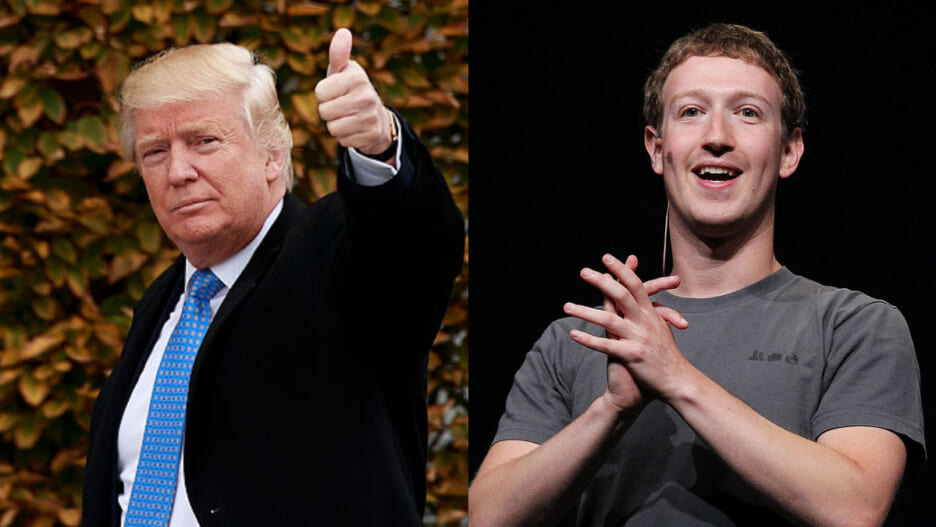Mark Zuckerberg And The Trump Era: A New Phase For Meta

Table of Contents
The Rise of Misinformation and Political Polarization
The Trump era amplified pre-existing problems on Meta's platforms, exponentially increasing the spread of misinformation and deepening political polarization. The platform's algorithms, designed to maximize engagement, inadvertently became powerful tools for disseminating false narratives and conspiracy theories. This created a perfect storm, where existing biases were reinforced and echo chambers flourished.
- Examples of significant misinformation campaigns: The spread of unsubstantiated claims about voter fraud during the 2016 and 2020 elections, the promotion of anti-vaccine narratives, and the proliferation of QAnon conspiracy theories all gained significant traction on Facebook, showcasing the platform's vulnerability to manipulation.
- The role of social media algorithms: Meta's algorithms, prioritizing engagement over accuracy, inadvertently amplified these harmful narratives, pushing them to wider audiences and reinforcing existing biases. The “like,” “share,” and “comment” features further facilitated the rapid spread of misinformation.
- The impact on public trust and the erosion of democratic processes: The rampant spread of misinformation eroded public trust in institutions and media outlets, contributing to societal division and undermining democratic processes. The impact extended beyond the US, influencing elections and political discourse globally. The scale of the problem raised serious questions about the responsibility of social media companies in safeguarding democratic processes. Keywords: Misinformation, Facebook, political polarization, social media algorithm, fake news, election interference.
Meta's Response to Regulatory Scrutiny and Public Backlash
The Trump era saw Meta facing intense regulatory scrutiny and a significant public backlash concerning its role in the spread of misinformation and its handling of user data. The company's response, often reactive and criticized as insufficient, forced significant changes to its policies and operational strategies.
- Key regulatory investigations and fines: Meta faced numerous investigations and fines from regulatory bodies worldwide, including the FTC, relating to data privacy violations and antitrust concerns. These investigations underscored the growing concerns about the power and influence of big tech companies.
- Changes in content moderation policies and algorithms: In response to criticism, Meta implemented changes to its content moderation policies and algorithms, aiming to curb the spread of misinformation and harmful content. However, these changes were often met with criticism for being inconsistent and insufficient.
- Zuckerberg's public statements and apologies: Mark Zuckerberg issued several public statements and apologies acknowledging the platform's shortcomings and promising to improve its efforts to combat misinformation. However, these efforts were often seen as insufficient by critics who pointed to the ongoing problems with harmful content on the platform. Keywords: Content moderation, data privacy, regulatory scrutiny, Facebook regulation, antitrust lawsuits, Zuckerberg apologies.
The Shift in Meta's Strategic Focus
The challenges faced during the Trump era played a significant role in Meta's strategic shift towards the metaverse. This pivot can be viewed as a diversification strategy, aiming to reduce reliance on the increasingly problematic advertising-driven social media model.
- The increasing importance of the metaverse as a strategic diversification: Investment in the metaverse represents a significant departure from Meta's core business, acknowledging the inherent risks and limitations of its existing social media platforms.
- Investment in VR/AR technologies and acquisitions: Meta has invested heavily in virtual reality (VR) and augmented reality (AR) technologies, acquiring companies and building its own hardware and software to establish itself as a leader in the emerging metaverse landscape.
- The potential benefits and risks of this shift: While the metaverse offers potential benefits in terms of diversification and new revenue streams, it also carries significant risks, including technological challenges, uncertain market demand, and ethical concerns. Keywords: Metaverse, VR, AR, Facebook metaverse, strategic shift, diversification, virtual reality, augmented reality.
The Long-Term Implications for Mark Zuckerberg's Leadership
The challenges of the Trump era significantly impacted Mark Zuckerberg's leadership and public image. His handling of the controversies, and the subsequent strategic shift, have long-term consequences for his legacy and the future of Meta.
- Changes in leadership style and communication strategy: Zuckerberg's communication strategy has evolved, with a greater focus on addressing criticisms and outlining the company's long-term vision. However, this hasn't fully quelled concerns about the company's power and influence.
- Impact on investor confidence and company valuation: The controversies surrounding Meta have had an impact on investor confidence and the company's valuation, highlighting the risks associated with operating in a highly regulated and politically charged environment.
- The long-term consequences for Zuckerberg's legacy: The Trump era will be a defining period in Mark Zuckerberg's leadership, shaping his legacy as a technology entrepreneur and raising crucial questions about the responsibility of big tech companies in a democratic society. Keywords: Mark Zuckerberg leadership, public image, investor confidence, company valuation, Facebook CEO.
A New Era for Meta – Beyond the Trump Era
The Trump era served as a pivotal moment for Meta, profoundly impacting its policies, strategies, and public perception. Understanding the relationship between "Mark Zuckerberg and the Trump Era" is crucial for comprehending Meta's current trajectory and its future challenges. The events of this period forced a critical reassessment of the company’s role in society, leading to significant changes in its approach to content moderation, data privacy, and strategic direction. The challenges of combating misinformation and political polarization, however, remain ongoing.
To delve deeper into the complexities of Mark Zuckerberg and the Trump Era, and how this shaped the future of Meta, explore further resources on [link to relevant resources]. The enduring challenges facing big tech companies in navigating political polarization and misinformation will continue to demand attention and innovative solutions in the years to come.

Featured Posts
-
 Steam Free Game Positive User Feedback
May 16, 2025
Steam Free Game Positive User Feedback
May 16, 2025 -
 Warriors Kings Game Draymond Greens Frank Opinion Of Jimmy Butler
May 16, 2025
Warriors Kings Game Draymond Greens Frank Opinion Of Jimmy Butler
May 16, 2025 -
 Padres Vs Yankees Game Prediction San Diegos Chances In New York
May 16, 2025
Padres Vs Yankees Game Prediction San Diegos Chances In New York
May 16, 2025 -
 Ai Therapy And The Surveillance State A Critical Examination
May 16, 2025
Ai Therapy And The Surveillance State A Critical Examination
May 16, 2025 -
 Resultado Paysandu Bahia 0 1 Cronica Goles Y Resumen
May 16, 2025
Resultado Paysandu Bahia 0 1 Cronica Goles Y Resumen
May 16, 2025
